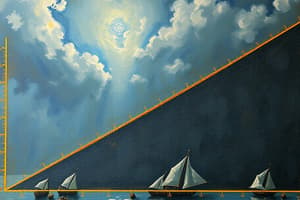Podcast
Questions and Answers
The higher price encourages producers to decrease their output.
The higher price encourages producers to decrease their output.
False (B)
In a mixed economic system, the public sector only intervenes when the private sector produces efficiently.
In a mixed economic system, the public sector only intervenes when the private sector produces efficiently.
False (B)
The opportunity cost is important in a PPF because it helps countries decide how to best allocate resources.
The opportunity cost is important in a PPF because it helps countries decide how to best allocate resources.
True (A)
Marginal benefit increases as more of a good or service is available.
Marginal benefit increases as more of a good or service is available.
Marginal cost decreases as more of a good is produced.
Marginal cost decreases as more of a good is produced.
All economies in the world are either completely free market or fully planned.
All economies in the world are either completely free market or fully planned.
Trade-Off is often expressed as the benefit that must be given up to obtain a desired product or experience.
Trade-Off is often expressed as the benefit that must be given up to obtain a desired product or experience.
Understanding the trade-off for every decision helps ensure that resources are used wisely.
Understanding the trade-off for every decision helps ensure that resources are used wisely.
Comparative Advantage refers to the ability of a person to perform an activity at a higher opportunity cost than someone else.
Comparative Advantage refers to the ability of a person to perform an activity at a higher opportunity cost than someone else.
In a mixed economic system, the price mechanism determines the allocation of resources.
In a mixed economic system, the price mechanism determines the allocation of resources.
Marginal benefit is the additional satisfaction gained from consuming one more unit of a good or service.
Marginal benefit is the additional satisfaction gained from consuming one more unit of a good or service.
Opportunity cost refers to the ability of an economy to produce greater levels of output.
Opportunity cost refers to the ability of an economy to produce greater levels of output.
Consumer sovereignty means consumers have no influence over what producers produce.
Consumer sovereignty means consumers have no influence over what producers produce.
The Production Possibility Frontier (PPF) represents the point at which an economy is inefficiently producing its goods and services.
The Production Possibility Frontier (PPF) represents the point at which an economy is inefficiently producing its goods and services.
The Price Mechanism allocates resources in a mixed economic system.
The Price Mechanism allocates resources in a mixed economic system.
Consumers casting a vote in the market means they directly elect producers to make goods.
Consumers casting a vote in the market means they directly elect producers to make goods.
Opportunity Cost refers to giving up the least valued alternative when making a decision.
Opportunity Cost refers to giving up the least valued alternative when making a decision.
Resources are fully employed and fixed according to the concept of Ceteris Paribus.
Resources are fully employed and fixed according to the concept of Ceteris Paribus.
Flashcards are hidden until you start studying




